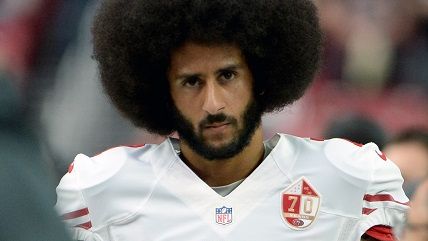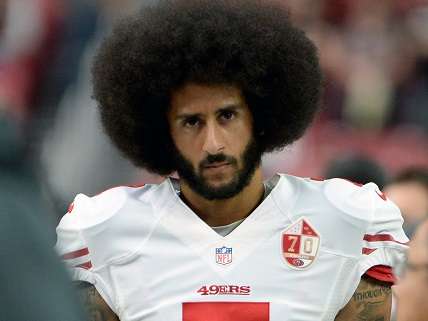Colin Kaepernick Didn't Vote, and That's Great
Says he wasn't going to be a hypocrite


San Francisco 49ers quarterback Colin Kaepernick, who gained prominence in the pre-season after refusing to stand for the national anthem as part of a protest against police abuse and conditions for African-Americans in the country, says he didn't vote in the presidential election.
In one of his earliest public statements, Kaepernick talked about how the election plays into his view of the problems for marginalized people in America. He called Trump an "openly racist" candidate but was more specific in his criticism of Hillary Clinton.
"I mean, we have a presidential candidate who deleted emails and done things illegally and is a presidential candidate," Kaepernick noted. "That doesn't make sense to me. Cuz if that was any other person you'd be in prison, so what is this country really standing for?"
Many Clinton supporters are now blaming not just Trump voters, but third party voters and non-voters as well, for Clinton's defeat. Such a for now total inability to acknowledge anything the candidate or her campaign staff might have done to earn a defeat, combined with the inability during the campaign for many Clinton surrogates to acknowledge any flaws in Clinton's policies or decision making process, probably vindicates the decision of many of the nearly 140 million people who did not vote for Clinton—either choosing another candidate or, like Kaepernick, making the decision to stay home.
Kaepernick defended his decision to vote from a sports media that largely believed was a hypocritical decision that hurt his credibility. "You know, I think it would be hypocritical of me to vote," Kaepernick said. "I said from the beginning I was against oppression, I was against the system of oppression. I'm not going to show support for that system. And to me, the oppressor isn't going to allow you to vote your way out of your oppression."
I've argued that it's important to vote, specifically to leave the presidency blank if desired, or to vote for third party candidates that reject the binary status quo. There are powerful political mechanisms maintaining the two party system, but it is still possible for tens of millions of people to reject it at the polls and challenge its authority. That millions of people are discouraged from doing so is as much a product of a virulently pro-status quo culture (even when it dresses up in anti-establishmentarianism like Che Guevara t-shirts) as any political mechanism working against third parties.
The most libertarian thing may have been what Kaepernick's done—not vote at all and reject the system. After all, as Katherine Mangu-Ward explained in 2012, your vote doesn't count. The 2016 election took up a disturbing portion of people's lives. Trump's election has caused many people to say they are in fear. But we should examine how we got here. In a Constitutional republic, not one person in the government should ever have so much power. Clinton supporters who describe Trump's victory as "catastrophic" for democracy have only themselves to blame. If the system were just one bad election result from a catastrophe, something should have been done to restrict the power of the presidency in the last eight years. It's the same argument Republican critics of Obama were faced with in 2008—if they believed Obama posed such an existential threat to America, they should not have spent their most recent 8 years in power mindlessly expanding the power of the federal government in general and the executive branch specifically. Partisans who continue to blame everyone for Clinton's loss but the candidate and her staff (all of whom appear poised to walk away from this scam pretty well off) are reinforcing and enabling a broken system.
Asked whether his cause was more "urgent" now that Trump had won, Kaepernick responded: "I think everybody should feel urgency, to make sure we're doing the right thing, building, you know, things the right way, in order to be able to protect ourselves from the things that may come from this."
Voices like Kaepernick's, calling on people to focus on how to limit the damage government can do to people, rather than focusing on who should take control of the government, will be crucial in getting the work underway to dismantle an overreaching executive and an out-of-control federal government that has made its way deeper and deeper into the lives of all Americans.
